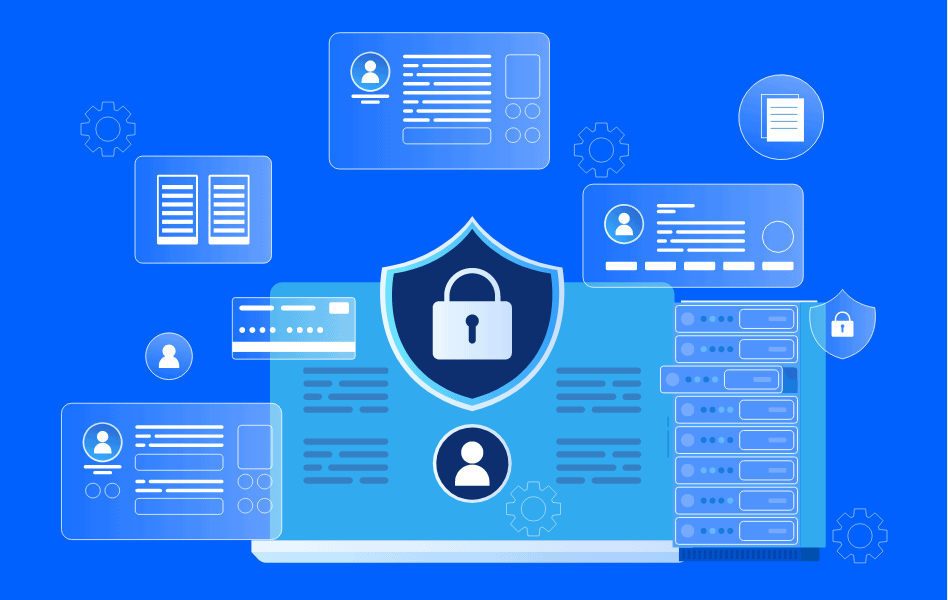Subscribe to Our Newsletter
Stay updated with the latest tips and strategies. Get additional discounts and alerts on offers.

Here are some of the data that is gathered in the process:
It is not uncommon for websites and platforms to collect information to exceed their customer’s expectations of experience. And most of the time online, customers are not even aware of their data being stored away in a cloud or system for future use. They remain unaware of how their data will be used, where, by whom, and for what. They additionally seem unaware of how their information is shared, transmitted, and utilized by businesses.
Therefore, we discuss various regulations to protect personal data, as mentioned. Let us dive in deeper to understand how data protection and privacy works.
Data protection and privacy are long-term terms with nuances and intertwining characteristics. They complement each other in the data industry and are significant players in building trust.
Data protection, in its essence, is the strategic and procedural steps taken to protect data from misuse. It includes availability, integrity of sensitive data, and safeguarding privacy. This procedure is implemented during the process of collecting, processing and storing of sensitive data.
Data protection is a player in the data industry put in place to ensure and prevent data loss, corruption, damage, and leak of sensitive customer information. Its major and understated responsibility remains to keep the data reliable, safe, and in compliance with data regulations worldwide.
Data privacy fits into the larger picture of data protection. It ensures the prevention of unauthorized use and disclosure of personal and sensitive data. By this, individuals, such as prospects and customers, can protect their privacy rights and keep their data confidential and safeguarded from misuse and demeanor. It concerns the proper handling of customer details and financial records of the customer.
Data privacy refers to regulations that help protect data, whereas data protection works as a mechanism.
Who controls what in data is an essential topic in discussion, and the distinction of the control remains uncertain. Data privacy is majorly in the control of the user or the customer. It is given to the user by the company.
Data privacy is who has collected what data lawfully and your control over who uses the data. Data protection ensures that the data collected is lawfully guarded from unlawful access by third-party platforms.
Data protection mainly works around protecting an organization’s assets – data.
Data privacy regulations hold companies responsible for how data is maintained and handled. The regulations hold companies accountable for any data leaks and breaches.
Data privacy regulations are built and implemented to protect the vulnerable population’s data. They also assist in preventing crime against an individual and maintain a consistent digital functionality of a company.
Regarding the main objective of data protection and regulations in the market, it holds the power to strike a perfect balance between safeguarding data and moving towards innovation with insights. These laws in discussion here enable companies and businesses to be empowered to harness informational insights and respect the privacy of those contributing to their mission statement and success.
The data firms and marketing teams collect via their website and social media is majorly used for targeted ads and improving the CX experience. Companies must be aware of these rules if they are just starting out or going paperless and digital for environmentally friendly procedures.
What can happen when data regulations are not implemented?
Sensitive data is growing and protecting it from hackers and theft is essential with time. The data policies in implementation have raised the seriousness of protections and encryptions to safeguard the data in the system and cloud.
The role of data protection tools is to shield businesses – small or big, from damage to reputation and financial losses incurred by distrust and unreliability. These tools ensure no scope for unauthorized access and fortify the authentication process to keep data safe, authentic, reliable, and trusted for business. An additional aspect of using data protection tools is to reduce the risk of threats for an organization and individual whose data is stored in the company.
To protect data from breaches and threats, it is essential and crucial to have the right software, gateway, and encryption to access. Using a combination of tools available to secure data in a digital locker case is often recommended for safety.
It is never enough when we express that data protection is key and cornerstone to the success and integrity of a business. It shields firms from financial, legal, and reputational damage and consequences after a data breach. It retains customer trust and acts as an asset open for research and development for your products, services, and solutions.
Compliance is not just a legal obligation for a business or company. Any innovative policymakers and lawyers would suggest it is a strategic necessity. By adhering to data privacy regulations, you won’t just be operating ethically but also fostering goodwill and your brand perception of customers. A legal research website provides businesses with valuable case studies and regulatory updates, ensuring they align their data protection measures with industry standards.
Data protection policies are essential for operational efficiency. You can showcase a resilient business infrastructure by implementing it in your business. You can additionally reduce the risk of cyber threats. This also doubles as benefits of data protection laws for a business!
If there is a bedrock to business running without snags in the market, data protection and privacy laws are the way to go. It helps you build trust and get success within your desired industry. They act as a guide towards ethical data practices. Data protection laws help you by being both a valuable asset and a potential liability.
In essence, it is not just a checkbox for companies to oblige to; it is an investment that will get you invaluable returns. It helps build reputation and enables sustainable growth when data is money and investment.
Data laws are changing every day. Take your step towards being updated on each of them every day and protect your data from breaches and theft. Let your brand flourish over time. Monitor your business growth with the best customers under your wing by getting the nuances of data protection laws right!
There are three major types of data protection –
Data protection deals majorly with data compliance, laws, and regulations on the local and international level. Its focus remains on how the data is gathered, managed, shared, and deleted.
Data security on the other hand avoids and restricts unauthorized third-party users to access data without authentication.
Show Some Love!

Subscribe to Our Newsletter
Stay updated with the latest tips and strategies. Get additional discounts and alerts on offers.
Related Articles
Subscribe to Newsletter
Stay up to date with the latest marketing, sales, and service tips and news.